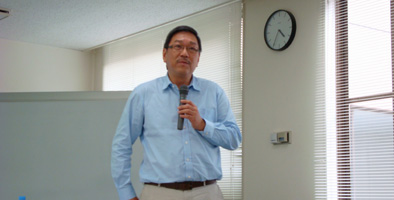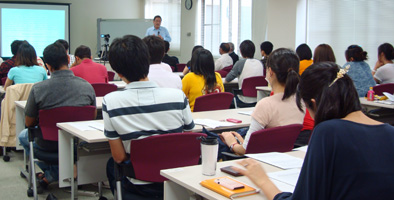Jun 7, 2012

Dr. HO-Kong Chong explained that the results of his project will generate some interest and honest discussions. He said that the project is not about publication alone, but to help make the university a better place. He asked why people all over the world have now shown interest in coming to Asia for higher education, over the established markets such as Europe, USA and Australia.
RCAPS Seminar: Dr. HO-Kong Chong (National University of Singapore)
On June 6, 2012, Dr. HO-Kon Chong (Associate Professor, Department of Sociology, National University of Singapore) was invited to present an RCAPS Seminar entitled “International students at APU: their decision to choose APU, their adjustment at APU and their future plans”.

Dr. HO-Kong Chong explained that the results of his project will generate some interest and honest discussions. He said that the project is not about publication alone, but to help make the university a better place. He asked why people all over the world have now shown interest in coming to Asia for higher education, over the established markets such as Europe, USA and Australia.
He used eight universities: two each from Japan, Korea and China, one from Taiwan and one from Singapore, to determine the structuring of the higher education industry in East Asia. His study used a critical infrastructure of a competitive economy, and the student migratory flows into these reformed institutions. He used graphs to illustrate how APU plays a critical role in this development and in understanding how APU promotes internationalization and understanding of the future plans of students.
Dr. HO identified that APU stands tall in terms of students getting a job before graduation, financial support, finding a part time job on campus, English language speaking, a multicultural studying environment, opportunities for further learning, social activities on campus and support facilities as compared to the other seven universities. But he mentioned that APU is very weak or under performing in reputation, recognizing qualifications, students’ interactions with professors, study areas. According to Dr. HO‘s research, most students preferred to study abroad after APU because of the advantage in foreign languages and exposure to an international studying environment.
Written by Mr AMO Thompson (APU GSAM)
Dr. HO identified that APU stands tall in terms of students getting a job before graduation, financial support, finding a part time job on campus, English language speaking, a multicultural studying environment, opportunities for further learning, social activities on campus and support facilities as compared to the other seven universities. But he mentioned that APU is very weak or under performing in reputation, recognizing qualifications, students’ interactions with professors, study areas. According to Dr. HO‘s research, most students preferred to study abroad after APU because of the advantage in foreign languages and exposure to an international studying environment.
Written by Mr AMO Thompson (APU GSAM)

Video(WMV)
PowerPoint(PDF)
- TOPIC
- セミナー

